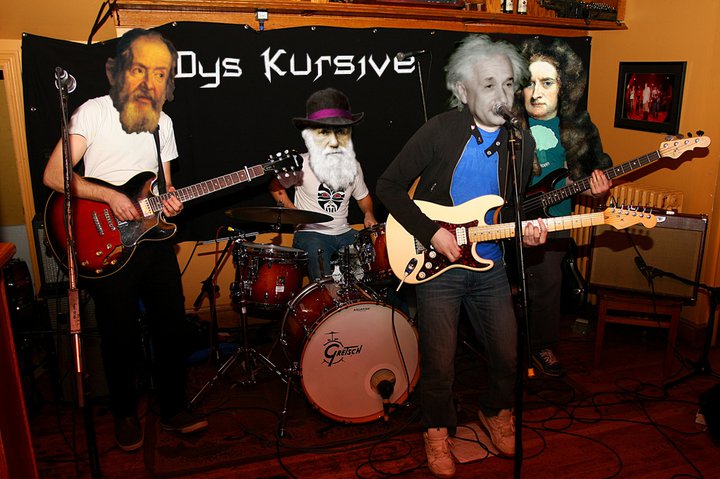Charles Darwin avoided publishing his ideas for twenty years, right until he had no choice but to publish. This tradition lives on today, we call it Grad School. His trepidation was well-advised, the theory of evolution initiated great conflict and bitter fighting, albeit more durably among the lay public than the academics. He probably would not have guessed that such conflict would remain a fixture of western society for over a hundred and fifty years, and counting. Unlike other revolutionary scientific ideas, such as Newtonian physics or germ theory of disease, Darwin’s evolution has required its public defenders in every generation. Why is this? Will it ever change?

Darwin was born this day in 1809, so it is well to take a piece of it to reflect on his life and grand legacy. Much has been written on the reasons for the social, political, and scientific upheaval that evolution brought. I recommend the Ever Since Darwin by Stephen Jay Gould, The Blank Slate by Steven Pinker, and Darwin’s Dangerous Idea by Dan Dennett. Today, perhaps half of Americans report accepting evolution fully. The rate is much higher in other parts of the industrialized world, however, even in most of those there remains intense reject or debate about the role of evolution in shaping certain parts, particularly the parts between the ears. For example, the state-sponsored Egalia school in Sweden where attempts are made to remove all reference to gender in the anti-scientific belief that there is no biological component to gender.
The subversive effects of Darwinian evolution include or have included,
- Obviating religious explanations of the origin of humans
- Humbling hubristic notions of humankind’s privileged place in the universe by placing it in the ranks of ordinary animals (or, conversely, by raising the awesomeness of animals)
- Contradicting any claims of racial superiority, and even the existence of race as a biological concept
- Questioning or contradicting unscientific theories about social organization and politics, from the Victorian, to the fascistic, to the post-modern that require racism, classism, sexism, or that deny the importance of the individual mind
Excepting perhaps the claims of racial superiority, these issues seem perennial. Sometimes the resistance to Darwinian evolution seems, and is, political, but at root Steven Pinker’s subtitle to The Blank Slate is more the issue: The modern denial of human nature. All of the theories that have sought to explain what humans are and why they are that way have been controversial, and for obvious reasons— they can be crafted to privilege one group, class, elite, or state over another. Marxism’s explanation of all history and conflict in terms of exploitation of the working masses was mighty attractive to the working masses who were being exploited. Notions of God-mandated superiority of the beige-skinned was mighty attractive to the beige people intent on conquering and harvesting the “new world” in the Age of Imperialism.
Science ups the ante on these potential problems. A bad, but accepted, scientific idea lends respect and authority to what would otherwise be a mere political belief, an opinion, not a fact. The social anxiety about the content and pursuits of scientists is therefore higher for all parties. While scientists and academies can be corrupted, science is still the best, most objective means of knowledge discovery humanity has ever produced. It frees us from the caprice and bias of untested and untestable self-privileging paradigms. Darwin’s own theory definitively destroyed the credibility of his own prejudiced belief that there are any great, inherent differences between any human populations (not within his lifetime, though). Not because it served someone’s interests to believe, but because those are the facts evolution allowed us to discover.
I am optimistic. The answer is yes, the fighting about whether evolution shaped our minds (and bodies) will end one day. I have said the struggle has persisted through the generations, and it has, but it has not gone unchanged through them. Globally, resistance to Darwinian evolution as scientific fact has waned. Acceptance has improved, even in the US. The struggle is not the same. In the early 20th century, common laws forbid the teaching of evolution. These laws have all failed, and efforts to enforce them were abandoned decades ago; the Supreme Court has ruled that creationism, meant to attack and displace biological evolution, is not permissible in the classroom.
A mere 60% of Americans endorse evolution, but a recent Pew poll showed that age makes a big difference, with 68% of the younger generation (29 and younger) accepting it. When the baby boomers are gone, public attitudes will shift dramatically.
Even the more liberal resistance to evolution, chiefly to the social science aspect, is waning steadily. The 70’s and 80’s had powerful, influential academics forcefully denouncing any important role of evolution in shaping human behavior (e.g. Stephen Jay Gould, Richard Lewontin). Nobody has taken their place. The most censorious critics of evolutionary psychology today are bloggers and pundits, not academics, save some non-social scientists such as philosophers. Reputable critics also have much less sweeping, much more restricted claims than before. While Gould-era critiques aimed at the base, suggesting the “adaptationist” enterprise was fundamentally flawed, today the refrain is one of media distortion, overreach by some sub-set of “bad” scientists, and public misconstrual.
There shall always be debate about the implications and meaning of the truths that science tells us about ourselves. That is most healthy and welcome. But I think Darwin’s struggle, the effort to gain public approval of investigation and basic legitimacy of found facts, will come to a close. Perhaps not soon or quickly or even within my own lifetime, but Darwin’s light will outlast the darkness around it.
